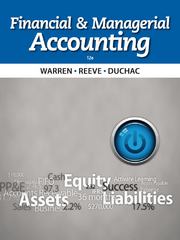Question
1. Which of the following statements best indicates the difference between data and information: a- information and data are the same. b- information is less
1. Which of the following statements best indicates the difference between data and information:
a- information and data are the same.
b- information is less useful than data.
c- information is always useful whereas data is only sometimes useful.
d- information is data that has been processed and converted
2. system can be defined as:
a- activities that are performed on inputs
b- any device used to capture data including manual keying and scanning.
c- any process that an accountant is involved in.
d- something that takes inputs, applies a set of rules or processes to the inputs and generates outputs.
3. An accounting information system can best be defined as:
a- The application of technology to the capturing, storing, sorting and reporting of data.
b- The application of technology to the capturing, storing, sorting and reporting of information.
c- The application of technology to the capturing, verifying, storing, sorting and reporting of data relating
to an organisation's activities.
d. The application of technology to the capturing, verifying, storing, sorting and reporting of information relating to an organisation's activities.
4. An accounting information system is unlikely to help a firm to:
a- eliminate financial fraud
b- decide how much to purchase from suppliers
c- determine the provision for bad debts
d- determine whether to approve a credit sale
5. Which of the following statements concerning ethics is correct?
a- Ethics is concerned with how we act and how we make decisions.
b- Electronic accounting information systems eliminate the need for ethical behaviour.
c- Professional bodies, such as CPA and ICAA, are placing less reliance on ethics and more on legal
compliance.
d. Ethical issues and legal issues are the same.
6. Which of the following statement regarding business processes is correct?
a. Business processes represent the series of discrete activities that deliver something of value to external customers
b. Business processes represent the series of discrete activities that deliver something of value to both internal and external customers
c. Business processes represent the series of interlocking activities that deliver something of value to internal customers
d. Business processes represent the series of interlocking activities that deliver something of value to both internal and external customers
7. XBRL stands for:
a- Extensible business reporting language.
b- Cross business reporting language.
c- Extended business report language.
d- Executable business reporting language.
8. Which of the following description of XBRL is true?
a. XBRL is a new technology that yet to be made a practical reality.
b. XBRL adds meaning to data so that other applications know what the data represents and how it should be treated
c. XBRL is fundamentally different from HTML.
d. A standard set of XBRL tags is not available yet.
9. Internal controls cannot:
a. Prevent anomalous and undesirable occurrences
b. Detect anomalous and undesirable occurrences
c. Correct anomalous and undesirable occurrences
d. Reverse the effects brought about by anomalous and undesirable occurrences
10. Internal controls do not control:
a. Physical assets in an organisation
b. Information resources in an organisation.
c. Business process efficiencies in an organisation. d. Human behaviours in an organisation.
Step by Step Solution
There are 3 Steps involved in it
Step: 1

Get Instant Access to Expert-Tailored Solutions
See step-by-step solutions with expert insights and AI powered tools for academic success
Step: 2

Step: 3

Ace Your Homework with AI
Get the answers you need in no time with our AI-driven, step-by-step assistance
Get Started


